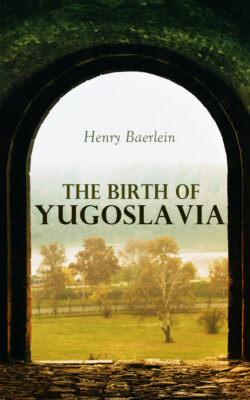Читать книгу The Birth of Yugoslavia - Henry Baerlein - Страница 10
На сайте Литреса книга снята с продажи.
THEIR UNFORTUNATE DEMOCRATIC WAYS
ОглавлениеThese Southern Slavs did not display the same genius for organization as the Germanic peoples or the Magyars at the period of their respective migrations. In communities of brethren (or bratsva, from the word brat, a brother) they had not raised up a king; but as a compensation they possessed a lofty moral code, a religion inspired by the worship of nature and by the principle of the immortality of the soul. Occupying themselves with agriculture and the rearing of cattle, it was not until they came into contact, that is to say hostile contact, with their more organized neighbours that they were compelled to join together under the authority of a prince, a knez. The bad result of this profoundly democratic spirit was that the Slavs, not knowing how to keep united, fell under the yoke of other nations. From the interesting series of documents, Latin, Arabic, Byzantine and others, which have been collected in Monimenta Sclavenica by Miroslav Premrou, notary public at Caporetto, and published in 1919 at Ljubljana (Laibach), we can see that the Slovenes occupied a much greater extent of territory than do their descendants of our day—"ab ortu Vistulæ … per immensa spatia … " (cf. Jordanis de orig. Goth. c. 5)—to beyond the Tagliamento, and from the Piave (cf. Ibrahim Ibn-Jakub[5]) to the Adriatic, the Ægean and the Black Sea.
One of the earliest of the above-named Slovene princes was Samo, a Slovene by adoption, who struggled in Pannonia against the Avars in the first half of the seventh century; it happened also in the year 626 that other Slovenes, as well as the Avars, attacked Constantinople. Both of them withdrew, the former being defeated at sea and the latter failing under the city walls. The Avars, having thus shown that they were vulnerable, had to bear an attack on a grand scale made upon them by the Slovenes, this attack being more shrewdly organized than any other transaction in which the Slovenes had as yet engaged. And they still appeared to be reluctant to form even a loosely knit State; they roamed about the Balkans and the adjacent countries to the north-west, seeking for lands that were adapted to their patriarchal organization. Not until the ninth century did they set up what might be called Governments on the Adriatic littoral, where they had no hostility to fear from the last remaining Romans, who were refugees in certain towns and islands.
